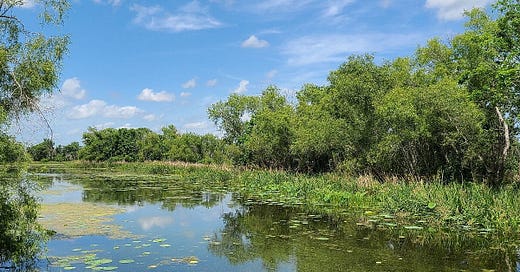Dear Stakeholders,
In our April full-group meeting, we focused on BCarbon’s work to understand and engage with carbon credit buyers. Our presentations covered recent carbon market trends, strategies for alignment with buyer interests, and new BCarbon initiatives, including the Texas Credit Concept. These discussions are helping to shape BCarbon's strategy as we adapt to evolving market conditions.
Our CEO Jim Blackburn started off the meeting with some BCarbon updates, including an update on his own plans for the future. While Jim will be stepping down as CEO later this year, he emphasized that he will remain engaged with the organization and continue to serve on our Board. Jim also reflected on how BCarbon's attitude toward credit buyers has evolved since 2019. Initially, BCarbon took a totally hands-off approach, leaving it up to our project developers to strike deals. Now, our approach has matured to recognize that the registry can maintain independence while still responding to buyer needs. We’ve learned that there is value in exploring new ways to support credit purchases, although the responsibility for closing deals still rests with project developers.
Following Jim's update, Research Manager James FitzGerald and Research Analyst Guido Bertola presented on carbon market trends. James highlighted some persistent challenges on the market, including flat demand, an oversupply of avoidance credits and undersupply of high-quality removals, and low prices. However, there are some encouraging signs, such as a likely increase in demand in the leadup to 2030, growing interest in projects with economic and social co-benefits, and a critical mass of companies sticking to their climate targets.
Guido presented on the Science-Based Targets Initiative (SBTi)’s evolving stance on carbon credits. Although they have been historically skeptical toward carbon credits, SBTi announced a significant shift in April 2024, recognizing that rigorous and properly documented credits could function as a tool for addressing Scope 3 emissions. While this announcement faced some internal backlash at the time, SBTi’s recently released Corporate Net-Zero Standard (V2.0) consultation draft reaffirmed this position that credits can play a role in addressing unavoidable emissions. The draft is available for public comment until June 1, 2025.
With these broader updates in mind, Director of Operations Melanie Martin and Director of Programs Sarah Swackhamer presented on aligning BCarbon with buyer needs and expectations. They started by reviewing the ICVCM's Core Carbon Principles, a widely discussed set of standards for voluntary carbon credits and registries since their launch in 2023. Sarah noted that while several methodologies have passed ICVCM’s two-pronged approval process, approvals for nature-based protocols remain modest. CCP-tagged credits haven't yet commanded market preference or premium, with buyers still focused on immediate availability rather than credits under review. Looking both toward and beyond ICVCM approval, Sarah outlined BCarbon's efforts to review requirements from ICVCM and others, which highlighted the importance of standard procedures, protocol enhancements, and improved public documentation.
Melanie and Sarah then discussed current initiatives at BCarbon to strengthen these key areas, including standardizing operating procedures, developing informational materials about our protocols, and enhancing our registry system’s accessibility. As an example of informational materials developed on BCarbon protocols, Melanie recapped the team’s recent work to create a slideshow and paper that present the key points of the Methane Protocol. On the registry side, Sarah discussed three areas of work BCarbon has taken on: creating a guidebook so our blockchain-based digital ledger is easier to navigate, developing user-friendly account infrastructure for Project Developers and buyers to view their credit balances and make transfer/retirement requests, and pursuing interoperability with third-party platforms to help project developers access a wider market for their credits.
Jim concluded with a presentation on a new approach to the issues discussed throughout the meeting: the Texas Carbon Credit Concept, which aims to protect working lands while meeting carbon credit buyer needs. The goal of the proposal is to gain a stamp of approval from the State of Texas, which could increase buyer confidence and facilitate expansion of BCarbon projects both in Texas and beyond. This initiative would be based on BCarbon’s existing protocols and draw on measured additionality, financial additionality, and avoided conversion additionality, supplemented by adoption of certain ICVCM Core Carbon Principles that are appropriate for the Texas context. A paper on this concept is available to read on our website.
You can view the compiled slides from all these presentations here:
We enjoyed the opportunity to discuss our current work with you all during this meeting, and look forward to continuing the conversation. Most notably, we’ll do so at the inaugural meeting of our new subcommittee on market positioning and buyer engagement on May 7, 2025. We hope to see you there! Below, you can find a full list of our upcoming meetings – both currently scheduled and to-be-announced.
Upcoming Meetings:
Full Stakeholder Working Group meetings: June 12 and September 11, 9 AM CT
Market Position and Buyer Engagement (including discussions of the Texas Credit Concept): May 7, 1:30 PM CT
Soil: mid-May (date TBA)
Biodiversity: late May/early June (date TBA)
To be added to any meeting, please contact Sarah (Sarah.Swackhamer@BCarbon.org)
All meetings held via Zoom.
Thank you for your continued engagement with and support of our work. If you have questions, comments, ideas, or concerns, please feel free to reach out. Take care and talk soon!
Best,
BCarbon



